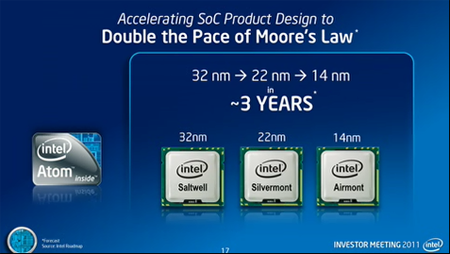Intel shakes up roadmap to attack ultra-mobile computing

At its annual investor meeting, which is being Webcast live today, Intel announced a significant change to its product roadmap designed to boost the company's efforts to get its chips into ultra-mobile devices of all shapes and sizes.
CEO Paul Otellini said Intel's future processors for laptops and mainstream desktops would be designed with a power rating of 10 to 20 watts. That's a major change from the 30- to 40-watt ratings of today's second-generation Core processors. This isn't the first time that Intel has made such a shift in its product roadmap--Otellini specifically cited the introduction of the Pentium processor and the Centrino mobile platform--but it is a significant one for Intel.
"We decided looking forward that our roadmap was inadequate, and we needed to change the center point," Otellini said. "This shift that we are making today is as fundamental. We are aiming our center point for all of our design activities from the 30 to 40 watts to 15 or so watts."
Intel will continue to have more powerful processors for high-end desktops, workstations and servers. Similarly, at the opposite end of the spectrum Atom will scale not only down to a few milliwatts, to get into smartphones, but also up to enable more powerful tablets, netbooks and other devices. The result, Otellini said, will be a product line that scales the entire continuum from phones to data centers with no gaps, at least in terms of power consumption.
These changes won't get Intel into more tablets and smartphones overnight, though. Otellini said that Intel is "on target" with tablets--it had previously announced that 35 tablets designs were in the works-but confirmed that the first smartphones won't arrive until the first half of 2012.
"I'm going to disappoint some of you today. You won't see a big announcement on smartphones or smartphone customers today." Otellini said. "Intel will be very successful here over time . . . we are focused very, very strongly on both phones and tablets."
Intel had previously said it was accelerating the pace of development in Atom, but it confirmed today that within the next three years it will ship Atom processors on 32nm (Saltwell), 22nm (Silvermont) and 14nm (Airmont).
While these will take time, the PC market remains alive and well, Otellini said. The message comes on a day when HP announced lackluster results largely because of slower-than-expected consumer PC sales. Otellini acknowledged the "perceived lackluster growth in the PC industry" in some markets, but he said the fast growth in emerging markets and a strong enterprise business were picking up the slack.
Overall Intel is seeing unprecedented demand for computing of all types--in devices and in data centers. To illustrate this, Otellini displayed a slide showing that 74.5 quintillion transistors were shipped last year or 10 billion transistors for every person on earth.
"About the only thing on earth that people make that can be measured in the quintillions is transistors," Otellini said. "I couldn't think of any better example to demonstrate the explosion of computing in our lives. This stuff is all around us."
Otellini recapped the recent development of Intel's process technology from the introduction of strained silicon in 2003 to the use of new materials (high-k and metal gates) in 2007 to the recent announcement of the new transistor design for the upcoming 22nm Ivy Bridge family. He argued that Intel has been extending its lead in silicon process technology, and this would give it an advantage in creating chips for all types of products.
"It comes down to who has the best transistor. It always has, and it always will," he said. "There's really no one on earth that has the capabilities we have demonstrated and are putting into production this year."
These new 22nm processors will enable Intel's customers to build laptops that are not just a little faster and a little smaller, but that operate completely differently. Otellini said these new laptops will not only be extremely thin, but will act more like consumer electronics with features such as instant on, multiple wireless broadband connections, a touch interface, the ability to run multiple operating systems and more powerful graphics and media processing.
